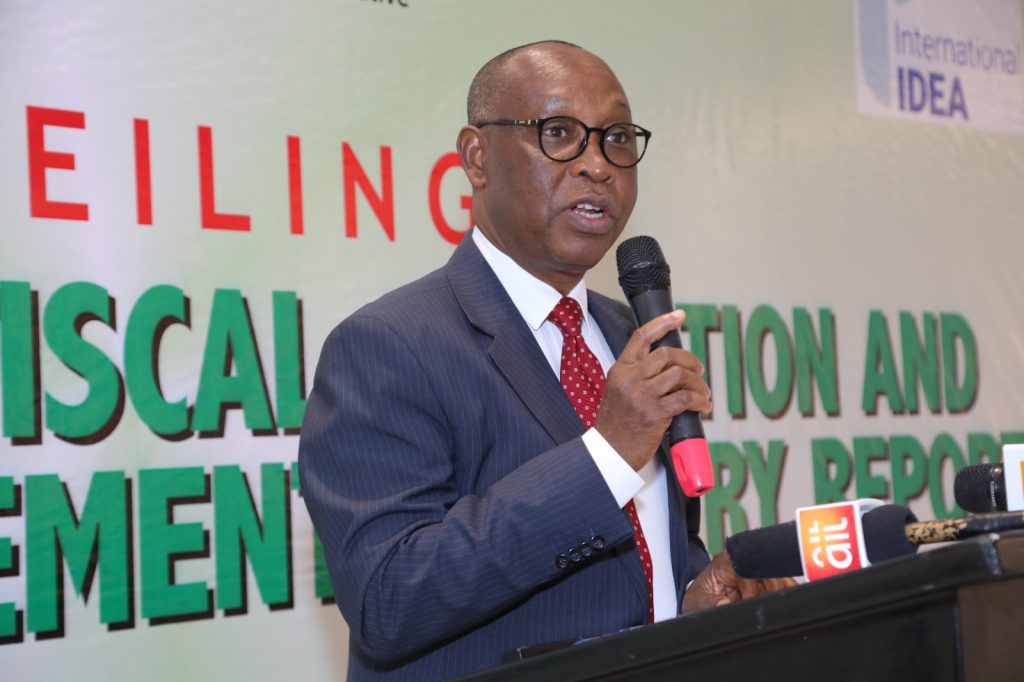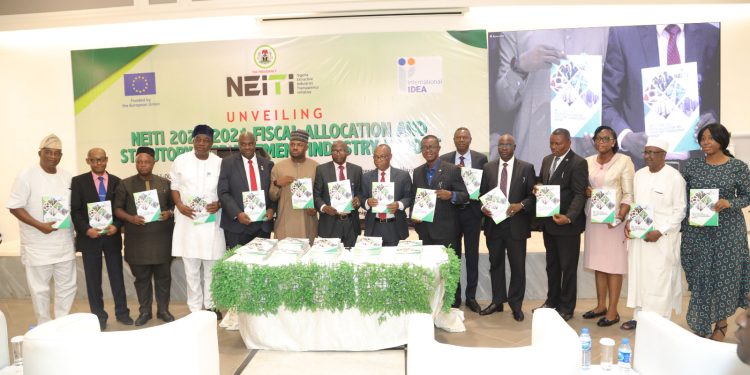From a total of about ₦14.38 trillion remitted as extractive sector revenue to the Federation Account (FA) between January 1, 2020 and December 31, 2021, a total of ₦5.42 trillion was disbursed to the Federal, State and Local Governments, the Nigeria Extractive Industries Transparency Initiative (NEITI) has disclosed.
The disclosure was contained in the latest NEITI 2020-2021 Fiscal Allocation and Statutory Disbursement (FASD) report published on Thursday in Abuja. The report, which is the fourth in the audit cycle by NEITI, revealed that overall remittances to the Federation Account for the period increased by about 14%.

The Executive Secretary of NEITI, Orji Ogbonnaya Orji, who presented the report said four of the five revenue generating agencies, namely the Nigerian National Petroleum Company Limited (NNPCL), the Nigerian Upstream Regulatory Commission (NUPRC), the Federal Inland Revenue Service (FIRS), the Ministry of Mines and Steel Development (MMSD), remitted about ₦6.40 trillion, or 44.5% of total, as mineral revenues, ₦4.80 trillion, or 33.37% of total as non-mineral revenues, while N3.2 trillion as value added tax (VAT). The audit did not however cover revenues from the Nigeria Customs Service (NCS).
The report said additional revenues came from other sources such as exchange gain (N234.32 billion), Domestic Excess crude Naira (N81.097 billion), excess crude oil (N105.257 billion), other non-mineral excess revenue (N240.45 billion), solid mineral (N16.83billion), FOREX Equalization revenue (N46.00 billion), FGN Intervention revenue (N244 billion), and Excess Bank Charges (N4.75billion).
Orji said the report showed that while the Federal Government received about ₦2.80 trillion, the 36 State governments got ₦1.45 trillion, and the 774 Local Government Councils received a total of ₦1.17 trillion, with a total of ₦859.66 billion was paid as 13% derivation nine oil-producing states, including Abia, Akwa-Ibom, Anambra, Bayelsa, Delta, Edo, Imo, Ondo, and Rivers.
Apart from examining total extractive industry revenues remitted to the Federation Account, Orji said NEITI’s FASD Report also tracked allocation and disbursements to statutory recipients as well as utilization and application of the funds by beneficiaries between 2020 and 2021.
Also, the audit covered eleven beneficiary agencies involved in the management of extractive industry’s funds as well as nine selected states from the six geo-political zones, namely Akwa-Ibom, Bayelsa, Delta, Gombe, Imo, Kano, Nasarawa, Ondo and Rivers states.
The report showed that the gross statutory revenue and VAT disbursement to the states for the period was about N4.65 trillion, with Delta, Rivers, Akwa Ibom, and Lagos receiving the highest allocations, while Gombe, Ogun, Ekiti, Plateau, Cross River, and Osun were states with the lowest allocations.
The beneficiary agencies included Tertiary Education Trust Fund (TETFund); Petroleum Technology Development Fund (PTDF); Niger Delta Development Commission (NDDC); Nigerian Content Development and Monitoring Board (NCDMB); Nigeria Midstream and Downstream Petroleum Resources Agency (NMDPRA) – PEF Nigeria Midstream and Downstream Petroleum Resources Agency (NMDPRA) – PPPRA. Others are: Nigeria Sovereign Investment Authority (NSIA); Development of Natural Resources Fund (DNRF); Stabilisation Fund; Ecological Fund; Excess Crude Account (ECA).
In its recommendations, the report urged the government to implement measures to stop the NNPC from recovering its expenses before remittance to FAAC to enhance financial transparency and accountability in its operations with the federation.
The report observed that while the removal of subsidy in petrol has helped to block revenue leakages and improve government revenue, alternative mechanisms should be explored to support vulnerable citizens and mitigating price fluctuations.
To address the significant cost to the Federation, the report urged the government to commission an independent consultant to conduct a comprehensive review and audit of the NNPCL’s deductions, to enhance accountability and identify areas for potential improvement or cost-saving measures.
On the need to review remittance mechanism, the report recommended that NNPC’s returns from the sales of crude oil allocated for domestic refining should be revised, and allowed to be made in foreign currency instead of in naira, to optimize the value of returns and better alignment with international trade practices.
Besides, the asked the government to ensure that remittance to the Federation Account was a function of revenue hence, by encouraging the NUPRC to establish a robust system to block revenue leakages.
In addition, apart from recommending for the full utilization of the e-recording and e-archiving options for easy access to data, the report also implored the government to develop and implement strategies to drive investments (both local and foreign) to the mining sector to boost revenue generation.
Again, the report said efforts should be made to develop high prospect minerals that can result in significant revenue generation and economic development, while collaboration should be encouraged between all tiers of government to fight illegal mining operations that result in huge revenue losses.
The report also wants the MMSD to engage with key stakeholders to develop a fiscal regime for the mining sector that would ensure revenue transparency and help track revenues from all mining operations, including taxes.
The publication of FASD report is in fulfilment of the Nigeria’s obligation to the global Extractive Industries Transparency Initiative (EITI) and in compliance with the provisions of the NEITI Act 2007.
Unveiling the report the Director of Audits, Sundung James who represented the Auditor General of the Federation, Shaakaa Chira, described the FASD report as a useful document for the role of the office.
Chira said the report, which was in fulfilment of NEITI’s mandateas enshrined in the country’s Constitution, would further assist the Auditor General’s office in auditing the Federation revenues, in terms of its collection, remittance, and disbursement processes as well as periodic checks of deductions and transfers made before remittances and the FAAC Allocations.
The Chief Executive Officer of Nigerian Midstream and Downstream Petroleum Regulatory Authority (NMDPRA), Farouk Ahmed, who represented by the Director Operations, NMDPRA, Oseni Adewale, acknowledged the role NEITI has played over the years, including promoting transparency in public and private sector businesses beyond the extractive industry.
Ahmed said NEITI’s demand for accountability from stakeholders has increased the sense of responsibility among agencies and government institutions towards enhancing revenue and maximum value for the Nigerian people.
The unveiling of the report would provide the opportunity for hindsight for a better foresight on the national revenue profile, disbursement and utilization, with implications for consolidation, improvement or possible review.
The Executive Director, African Centre for Leadership, Strategy and Development (Centre LSD) and the global representative of the Publish What You Pay (PWYP), Monday Osasah, who said NEITI, through its various audit reports and findings, has simplified the work of the civil society, charged them to use the information provided as a tool for further advocacy for extractive industry value.
The report was compiled by an Independent Administrator, Messrs Amedu Onekpe & Co., on behalf of the National Stakeholder Working Group (NSWG), otherwise called NEITI Board, in accordance with the NEITI Act, 2007 and the EITI Standard.




